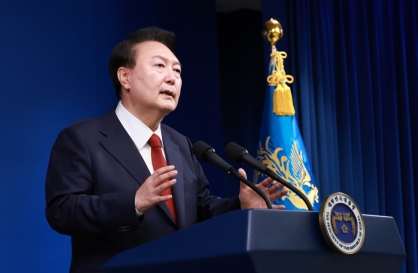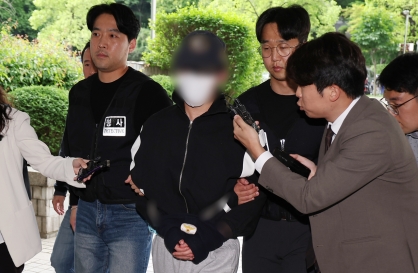The last-minute cancellation of inter-Korean high-level talks was seen to put a damper on President Park Geun-hye’s principled trust-building process, with critics questioning whether “inflexibility” cost an opportunity to defrost relations with the wayward North.
Public sentiment in the South was largely split on the talks breakdown after the two Koreas failed to agree on the rank of chief delegates. Progressives criticized the government’s failure to negotiate with leeway in dealing with Pyongyang, while conservatives supported the principle-based strategy as necessary to normalize relations with the North.
“We ended up losing the essence (of our purpose) to construct peace on the Korean peninsula by playing a consuming tug-of-war,” said Democratic Party leader Kim Han-gil during a party meeting.
But the ruling Saenuri Party endorsed the government’s stance.
“It is questionable whether the North views us as an equal dialogue partner. There were times where we would be grateful just for their offer to meet and provide incentives in return. Such a wrongheaded habit caused the talks to fall apart,” floor leader and Park’s close associate Rep. Choi Kyung-hwan said.
The Park government, meanwhile, remained steadfast in its position that the North should attend talks with the South in a format befitting the “international standard.”
In line with Park’s previous remarks that “the format defines the contents of the talks,” Unification Minister Ryoo Kihl-jae said Wednesday that Seoul would not be making another offer, urging Pyongyang to come back to dialogue with sincerity.
Public sentiment in the South was largely split on the talks breakdown after the two Koreas failed to agree on the rank of chief delegates. Progressives criticized the government’s failure to negotiate with leeway in dealing with Pyongyang, while conservatives supported the principle-based strategy as necessary to normalize relations with the North.
“We ended up losing the essence (of our purpose) to construct peace on the Korean peninsula by playing a consuming tug-of-war,” said Democratic Party leader Kim Han-gil during a party meeting.
But the ruling Saenuri Party endorsed the government’s stance.
“It is questionable whether the North views us as an equal dialogue partner. There were times where we would be grateful just for their offer to meet and provide incentives in return. Such a wrongheaded habit caused the talks to fall apart,” floor leader and Park’s close associate Rep. Choi Kyung-hwan said.
The Park government, meanwhile, remained steadfast in its position that the North should attend talks with the South in a format befitting the “international standard.”
In line with Park’s previous remarks that “the format defines the contents of the talks,” Unification Minister Ryoo Kihl-jae said Wednesday that Seoul would not be making another offer, urging Pyongyang to come back to dialogue with sincerity.

Park’s principle-based approach has been applied throughout her political career that began in 1998. It has at times pushed her to the corner in fierce political struggles but also helped her rescue the conservative Grand National Party, the precursor to the Saenuri Party, from crisis.
During the presidential election, Park’s preoccupation with principle received flak when her in-party rivals demanded changes to the primary rules, to which the former party chairwoman remained resolutely opposed. Her refusal to even discuss it, citing that rules were rules, invited heavy criticism, but eventually led to her contenders withdrawing from the race.
Even after her election and inauguration, her philosophy was unchanged, such as during the political standoff over her government reorganization plan, which was eventually endorsed by the rival parties with minimal change.
The trust-building process reflects a similar outlook of Park, in which trust would be achieved through upholding promises, reciprocity and principle.
Such an approach was evident in the Park administration’s measures toward the North’s provocations earlier this year including a shutdown of Gaeseong industrial complex. Park maintained that provocations would not be reciprocated with reconciliatory gestures and also withdrew the remaining South Korean workers from the complex for safety reasons.
When the North started making reconciliatory gestures such as a proposal to co-host the landmark June 15 agreement on a civilian level, the Park government answered that they first talk government-to-government regarding the suspended industrial park.
Upon the North’s surprise proposal last week to hold government-level talks to discuss a host of issues including Gaeseong, Mount Geumgangsan tours and family reunions, the two Koreas wasted no time to reconnect the cross-border hotline to start preparing for the talks.
The two sides, however, eventually became deadlocked over the delegations, with both sides demanding minister-level heads for each team.
Some also argued that principle should be based on accurate and precise facts, citing it should also be taken into account how different interpretations of the government structure were possible between the two Koreas.
“While President Park has showcased exemplary administrative style by keeping to her principles, consideration for such details should have been paid by her aides (ahead of the negotiation) in order to avoid such confusion,” said professor Shin Yul of Myongji University.
By Lee Joo-hee (jhl@heraldcorp.com)
-
Articles by Korea Herald









![[K-pop’s dilemma] Time, profit pressures work against originality](http://res.heraldm.com/phpwas/restmb_idxmake.php?idx=644&simg=/content/image/2024/05/08/20240508050705_0.jpg&u=20240508171126)









![[Today’s K-pop] Stray Kids to drop new album in July: report](http://res.heraldm.com/phpwas/restmb_idxmake.php?idx=642&simg=/content/image/2024/05/09/20240509050659_0.jpg&u=)